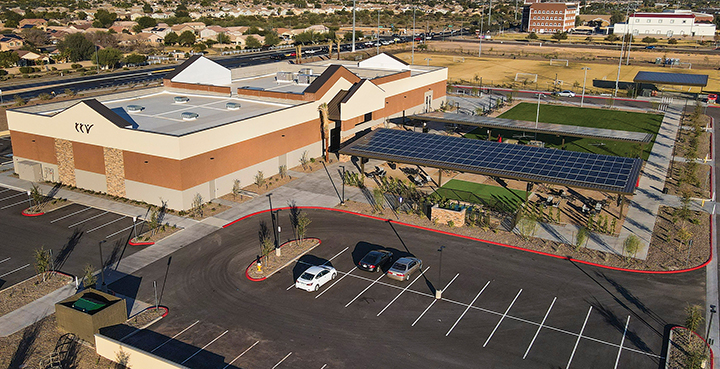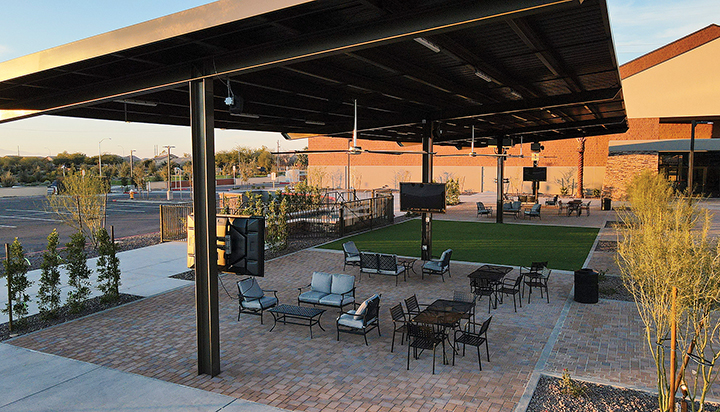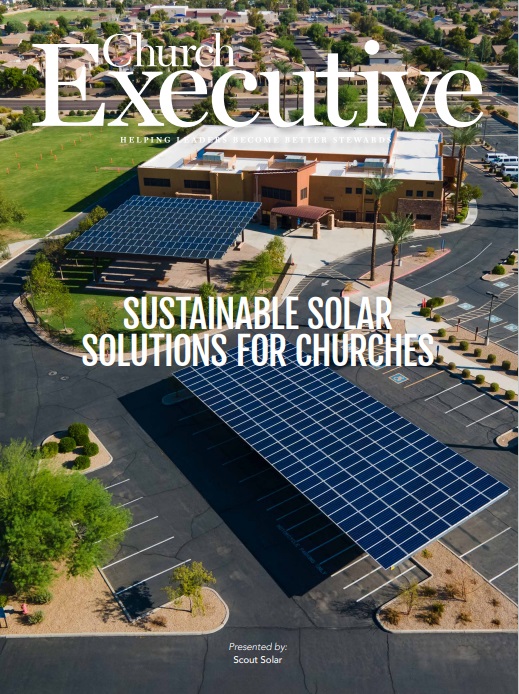
For one of the country’s biggest, fastest-growing churches, solar structures make a lot of ministry (and monetary) sense
In the Phoenix metro area, Christ’s Church of the Valley is a household name. Around the country, it’s similarly well-known as the second-largest and fastest-growing church in America, according to the 2021 Outreach 100 list.
But even for this massive church with 13 campuses — located in one of the warmest U.S. states — installing solar structures wasn’t an instant decision.
By RaeAnn Slaybaugh
“It probably took us three or four years just to get to the point where we’d vetted multiple [solar providers],” says Jon Carr, CCV’s director of construction and operations.
In the end, the church enlisted Tempe, Ariz.-based Scout Solar LLC because, as Carr says, the connection felt most like a partnership.
“We told them, ‘Hey, just be straightforward with us. What’s the rebate? What will our costs be?’” he recalls. “They answered all those questions, and it became really apparent that it was a good fit.”
For Scout Solar, after helping more than 65 churches go solar, bringing CCV’s vision to life came naturally.
While solar shades are most typically found over parking lots (especially in the desert), CCV wanted to create destination spots on its new Laveen campus. Shade structures would be installed over the outdoor barbeque, as well as over a baptistry and above the entrance to the building, which is a gathering place for families.
By knowing what they wanted — and working it into the construction process early — CCV leaders were able to save significant construction costs.
Originally, CCV’s Carr says, the church budgeted more than $500,000 to build a similar type of shade canopy in front of the buildings, plus another $100,000 for infrastructure. In meeting with Scout Solar, however, church leaders discovered that the company had its own architects and engineers who could do all the permitting and coordination with local power companies.
“Basically, they were able to do all the infrastructure, the metal work, and the canopies at no cost to us,” he explains. “So, at minimum, it saved us half a million dollars.”
And that was just the savings up front. The church will also reduce its utility spend every year as well for the next 30 years.

A wise investment
In 30 years, once solar structures are installed on all its campuses, it’s estimated that CCV will save 7.5 million gallons of gas; 78,450 acres of trees; 22,941 tons of waste recycled instead of landfilled; and $4.1 million on utilities, plus millions of dollars in shade structures.
In the meantime, installing solar structures at the Laveen campus alone has already significantly impacted that campus’s capital budget. The money it has saved on its structures will be allocated to adding outdoor TVs, fans and other amenities that make these spaces true community spots in a desert climate.
Further, once the solar installations are complete on just half the campuses, CCV is projected to save nearly $4.1 million in utility costs over the expected life of the systems. As far as Carr and his team are concerned, it lines up perfectly with the church’s approach to financial stewardship.
“As a church, we’ve always spent our money almost in one-thirds,” he explains. “We place a high value, first, on our weekend auditorium; second, on our kids programming; and third, on community spaces.
“In Arizona, with our weather — as beautiful as it is and the amount of sunny days — shade is a premium,” he adds. “So, when we found the right solar partnership, it was really a no-brainer.”

While CCV Laveen is likely to enjoy electricity savings for about 30 years thanks to its solar structures, Bill Becker, co-founder of Scout Solar, says most churches and parishioners don’t really focus on the daily savings. “They do feel the 30-degree temperature difference during the 120-degree Arizona days, though,” he points out.
This comfort level is especially crucial as CCV members return to in-person church, post-COVID. Since April, the church has surpassed 100 percent of its pre-pandemic attendance.
“I think a lot of that happened because people missed hanging out with one another, getting a meal afterwards, and sitting and watching their kids play,” Carr says. “That’s something you can’t offer online.”
Now, guests can comfortably and safely congregate around the outdoor grill and baptistry or enjoy fellowship in front of the building. “It lets us showcase our focus on community and people hanging out on our campuses,” Carr says. “Ultimately, we’re collecting everybody in one area so that they can witness life change, hang out, and just do life together.”
Ctrl+C, Ctrl+V
CCV and Scout Solar are now permitting the same solar structures configuration at three new ground-up campuses that are in the works.
“Now that we’ve seen the proof of concept, we know we’re saving money by putting all these canopies up,” Carr explains. “Scout Solar can look at our current energy savings and size the new campuses’ systems to maximize those.”
“Plus, we haven’t had to spend a dollar to do any of that work yet,” he adds.
That’s great news for CCV’s core mission, its charity efforts, and its ability to better champion worthy causes.


